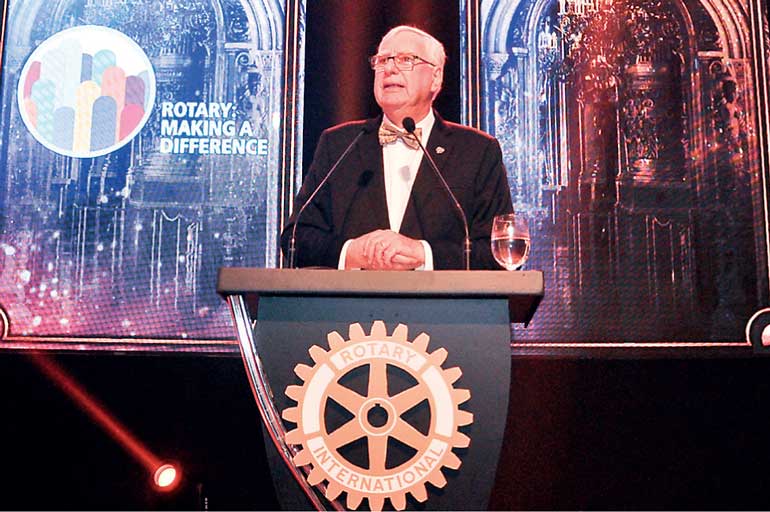Wednesday Feb 25, 2026
Wednesday Feb 25, 2026
Thursday, 30 November 2017 00:00 - - {{hitsCtrl.values.hits}}

Rotary International, a non-profit service organisation, saves billions of lives through its humanitarian acts and is open to all people regardless of any social background. Rotary works towards a better world for all and its most notable current global project, PolioPlus, is close to achieving global eradication of polio and has now reached 99.99% of its goal. In this interview with Daily FT, Rotary International President Ian Risely speaks about Rotary’s service in Sri Lanka and its achievements in attaining a polio-free world
By Shannon Jayawardena
Q: As Rotary has a permanent seat in the UN, to what extent is Rotary involved when it comes to government-related issues, say the alleged war crime allegations that were recently made?
A: Well Rotary does not take political approach to anything and we’re above politics. Our involvement in the UN is from a perspective of humanitarian work. We work for the people and that is our sole aim.
Q: How would you rate Rotary Sri Lanka’s performance in the areas of polio, cancer eradication and in the recent kidney ailment due to water issues which Rotary has helped with global funding?
A: Rotary in Sri Lanka is outstanding and they do wonderful work. It was an inspiration to the communities in this part of the world when Rotary assisted the eradication of polio from here as being the first country to eradicate polio in South Asia. That’s extremely positive from everyone’s perspective and so Rotary does a lot of work in that regard, it’s noble in Sri Lanka.
Q: Congenital heart disease is one of the major killers in Sri Lanka for children under five years of age, thereby the Human Heart Valve Bank Project which you gifted to the people of Sri Lanka can save approximately 1,500 children’s lives annually. Could you tell us about this?
A: It’s exciting. Who wouldn’t be positive about saving children’s lives and it’s a really good example of the way of which Rotary does work in its local communities. It’s really exciting and I’m looking forward to it very much.
Q: Post the tsunami, Rotary partnered with the Government in building 25 new schools which helped 15,000 children go back to school. How is the Rotary Foundation planning to support this project like it did back then?
A: That’s a really good example of what Rotary does. The tsunami was a terrible thing and Rotary locally said ‘what can we do and how can we help?’ So the decision was made to work on schools. I’m from Australia, one of the district governors from my part of Australia was of Sri Lankan origin and he heard about the proposals. He did a big fund raising in all of Australia and set a lot of money to assist that. That’s one of the advantages of Rotary, because we’re everywhere and we help each other.
Q: I’m told that the current percentage of the world being free of polio is 97%, and Rotary has invested in around $1.5 billion dollars to partner with governments across the world in working towards a polio free world, when are you hoping to achieve this target?
A: Now, the success is much more than that. We started with 350,000 cases a year, 1,000 cases a day in 1985. We’re now 15 cases in 11 months this year. I’m an accountant so I can assure you that the percentage is at 99.99 at present, and almost gone. Unfortunately the last tiny bit is always going to be the most difficult because it tends to be in countries where there is some sort of conflict taking place and we’re talking here about the border between Afghanistan and Pakistan in particular, but we’re confident that it isn’t too far away.
We have to keep going to finish the job because we’ve been at this since 1985 so it’s absolutely critical. However we do have great partners in the World Health Organisation, UNICEF and of course the Bill and Melinda Gates Foundation which has been very generous in their financial support. Thereby we have had a good team together and we’ve had fabulous success. Who would have believed that India will be polio free almost three years ago? It’s truly fabulous so we just have to keep going until it’s done and we’re optimistic it’s not far away.